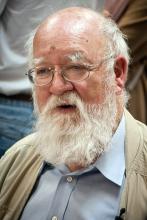What Is It
Is there any reason to think the cause or causes of order in the universe bear an even remote analogy to human intelligence? Even if they did, would that mean these intelligent causes had the benevolence and sense of justice required of a Christian God? Is this whole issue one of science, religion, or philosophy? These questions, considered by Hume, have now become the focus of a national debate. The philosophers discuss intelligent design with Daniel Dennett, Director of the Center for Cognitive Studies at Tufts University, author of books on consciousness, evolution, and freedom.
Listening Notes
John points out that Hume discussed the argument from design in his Dialogues on Natural Religion. Ken says that before Darwin there was no good reason to doubt the design argument. The theory of evolution provides a theory that explains how life could be so complex without design. Ken introduces Daniel Dennett, professor at Tufts University. Dennett discusses an argument against evolution that says some things could not have evolved because they are irreducibly complex. Dennett emphasizes that while lots of people have tried to find irreducibly complex organisms, no one has found one. Aren't there open questions about how certain structures come to be? There are a lot, but Dennett thinks they will eventually be solved. Dennett says that evolution is not a completed theory. Does this mean that it is a 'mere' theory and not a fact? No, Dennett explains, it means that there are some parts that are confirmed and some parts that are still being investigated, but on the whole it is accepted. Is intelligent design (ID) worse than evolutionary theory? Dennett thinks so because ID does not have testable consequences and makes no observable predictions.
Is ID science? ID proponents don't publish in peer-reviewed journals and they don't make verifiable predictions. Is the journal problem because of a bias in the science community? Dennett says it is because the ID people have not been able to present a good case. Dennett thinks there is an equivocation about different senses of "design" being employed by the ID camp. Dennett thinks it is a mistake to think that evolution proceeds solely by selection. There are additional mechanisms at work. Religion provided people with a narrative framework for their lives. ID lets people keep that. Can evolution allow for those life-affirming narratives? Dennett thinks that we can still create those stories with evolution in mind. Is there an inherent contradiction between evolution and theism that ID theory gets around? Dennett thinks the contradiction depends on what sort of deity the theist wants.
Should ID be taught in high school? Dennett thinks we have the duty of teaching our best confirmed, best known theories in high school, which means teaching evolution and not ID. John thinks that ID is teachable outside of the biology classroom, say, in a philosophy class. Should science be taught as fact or as a 'mere' theory? This question mixes up a couple of senses of 'theory'. Dennett does not think that we should let science stop us from talking about religion.
- Roving Philosophical Report (Seek to 04:20): Polly Stryker interviews a high school biology teacher who teaches evolution and a spokesperson for the National Center for Science Education about the difference between evolutionary theory and design theory.
